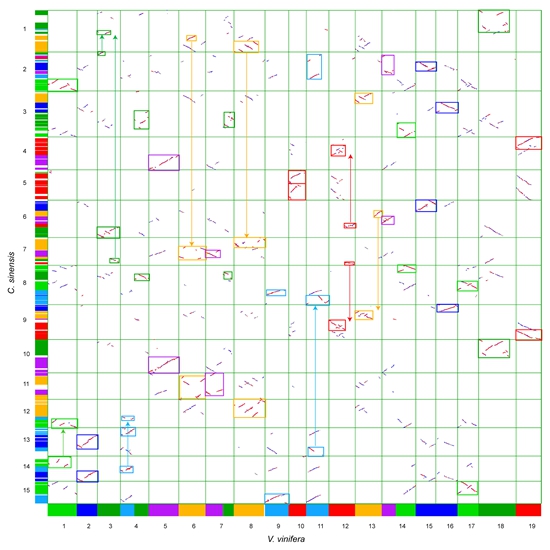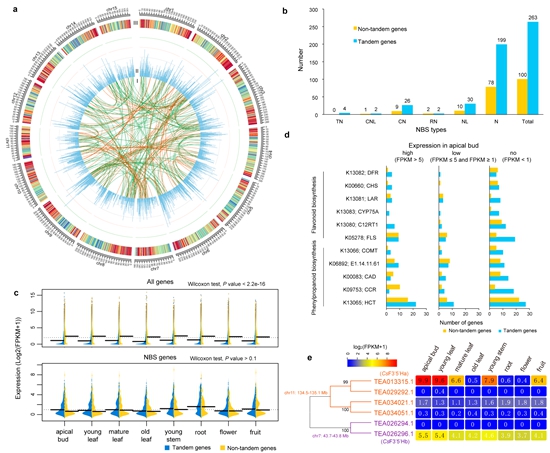Tea Research Institute Reveals Chromosome-scale Genome of Tea Plant
Tea is one of the most popular non-alcoholic beverages for its characteristic secondary metabolites that have numerous healthful benefits. However, the lack of chromosome-scale assembly hampers the understanding of fundamental genomic architecture and the improvement of tea plant. A recent study conducted by researchers from Tea Research Institute (TRI) reveals the evolution and diversification after the recent tetraploidization event in tea plant.
In this study, researchers performed genome-wide chromosome conformation capture technique (Hi-C) to obtain a chromosome-scale assembly based on the draft genome of C. sinensis var. sinensis and successfully ordered 2,984.7 Mb (94.7%) scaffolds into 15 chromosomes. The scaffold N50 of the improved genome was 218.1 Mb, increased by ~157-fold higher than that of the draft genome. Researchers clarified only one Camellia recent tetraploidization event (CRT, 58.9~61.7 Mya) occurred after the core-eudicot common hexaploidization event (ECH, 146.6~152.7 Mya).

Meanwhile, 9,243 genes (28.6%) occurred in tandem duplication and most of these expanded after CRT event. These gene duplicates increased functionally divergent genes that play important roles on the tea-specific biosynthesis or stress response.

Sixty-four catechin- and caffeine-related QTLs were anchored to the chromosome assembly. Of these, two catechin-related QTL hotspots derived from the CRT event, which illustrated that polyploidy has played a dramatic role in the diversification of tea germplasms.

The availability of a chromosome-scale genome of tea plant holds great promise for the understanding of genome evolution and the discovery of novel genes contributing to the agronomically beneficial traits in future breeding program.
The discovery was published in Horticulture Research in a paper entitled “The chromosome-scale genome reveals the evolution and diversification after the recent tetraploidization event in tea plant”. The research was funded by the Ministry of Agriculture and Rural Affairs of China through the Earmarked Fund for China Agriculture Research System (CARS-019), the Chinese Academy of Agricultural Sciences through the Agricultural Science and Technology Innovation Program (CAAS-ASTIP-2017-TRICAAS) and the Zhejiang Provincial Natural Science Foundation of China (Grant LQ20C160010).
Link of research paper in Horticulture Research:
https://www.nature.com/articles/s41438-020-0288-2
By Chen Jiedan (chenjd@tricaas.com)
-
 Apr 18, 2024Opening Ceremony of the Training Workshop on Wheat Head Scab Resistance Breeding and Pest Control in Africa Held in CAAS
Apr 18, 2024Opening Ceremony of the Training Workshop on Wheat Head Scab Resistance Breeding and Pest Control in Africa Held in CAAS -
 Apr 03, 2024IPPCAAS Co-organized the Training Workshop on Management and Application of Biopesticides in Nepal
Apr 03, 2024IPPCAAS Co-organized the Training Workshop on Management and Application of Biopesticides in Nepal -
 Mar 28, 2024Delegation from the School of Agriculture and Food Science of University College Dublin, Ireland Visit to IAS, CAAS
Mar 28, 2024Delegation from the School of Agriculture and Food Science of University College Dublin, Ireland Visit to IAS, CAAS -
 Mar 25, 2024Director of World Food Prize Foundation visited GSCAAS
Mar 25, 2024Director of World Food Prize Foundation visited GSCAAS -
 Mar 20, 2024Institute of Crop Sciences (ICS) and Syngenta Group Global Seeds Advance Collaborative Research in the Seed Industry
Mar 20, 2024Institute of Crop Sciences (ICS) and Syngenta Group Global Seeds Advance Collaborative Research in the Seed Industry
